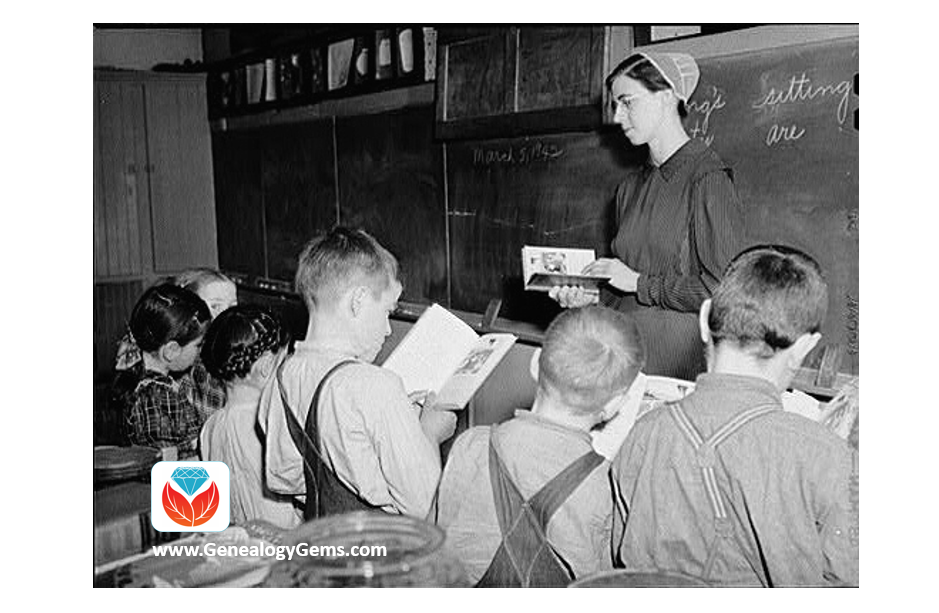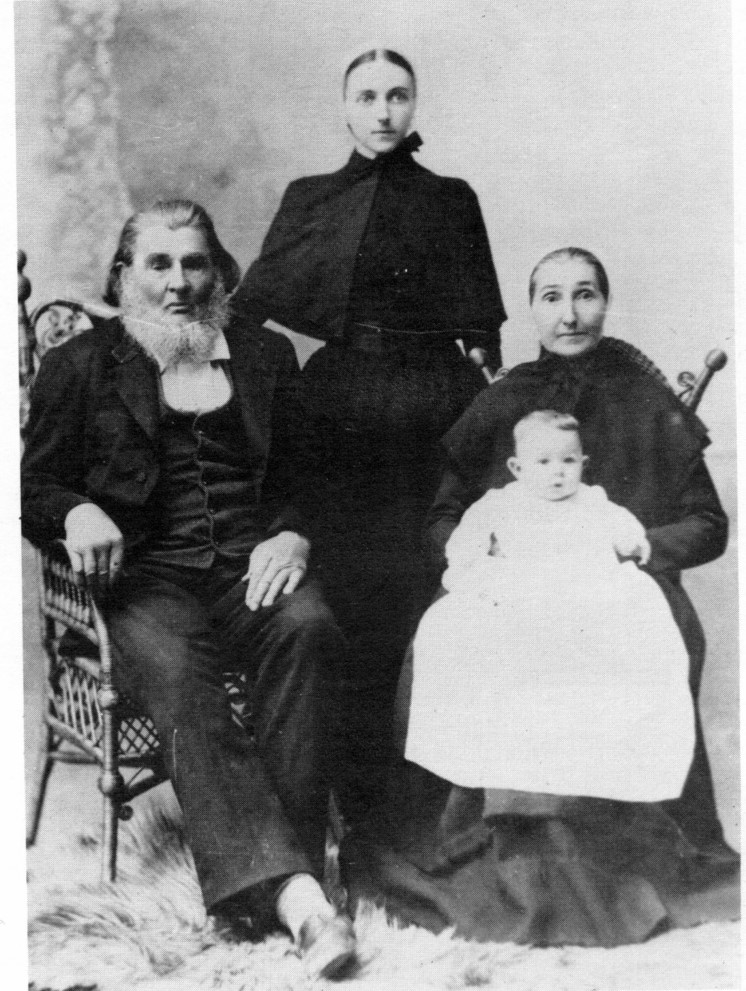Beginning Genealogy – Get Started Here
If you are new to genealogy and family history, you are in the right place. Here’s a game plan for learning the ropes, getting inspired and making quick progress.

The Genealogy Gems Blog
 Start by reading 4 Beginning Genealogy Answers to Get You Started
Start by reading 4 Beginning Genealogy Answers to Get You Started
This article comes from a large collection of articles on our website just right for beginners. Our blog post articles are organized by topic.
All you need to do to find all of our past Beginning Genealogy articles is head to our website’s home page (image right) and use our Select Content by Topic menu.
You’ll find it at the top left just under the main red menu. Click the down arrow and select “Beginner” from the list. This will display all our past Beginner-friendly articles on your screen starting with the most recent. (Or simply click here to go right to the Beginner article search results.)
Our Podcasts
 The free Family History: Genealogy Made Easy podcast (like an online radio show) is sort of a “Genealogy 101” class.
The free Family History: Genealogy Made Easy podcast (like an online radio show) is sort of a “Genealogy 101” class.
Each episode is about 30 minutes long, and it will start you at the beginning and walk you through the genealogy research process.
You’ll find it not only educational but also inspirational. You’ll hear from expert genealogists about research strategies, as well as their own inspirational stories that will help motivate you to succeed in climbing your family tree!
Here’s where you can listen to the Family History podcast:
There are 45 episodes in the series. By the time you get to the end, you’ll be well on your way and ready to dig into to The Genealogy Gems Podcast. This is an ongoing monthly podcast with hundreds of episodes for your family history listening pleasure!
The Videos
 The Genealogy Gems YouTube channel is packed with free videos on a wide variety of genealogical topics. We group them by category into “Playlists” for your convenience.
The Genealogy Gems YouTube channel is packed with free videos on a wide variety of genealogical topics. We group them by category into “Playlists” for your convenience.
Below you can watch our Beginning Genealogy playlist of videos. Simply click the icon in the upper left corner of the video player and scroll through the list. As we add new videos we will continue to add videos to the playlist.
DNA – Genetic Genealogy

New to DNA?
Watch the video below which features our own DNA expert Diahan Southard. She explains DNA testing for genealogy is a wonderful, easy-to-understand way.
Want more from your DNA results?
If you have started your family history journey by getting your DNA tested, you will want to get the most from your results. Your results can match you with other relatives, but you will need to have a family tree built so that you can capitalize on those connections. Use the resources and suggestions already mentioned above on this page to accomplish that goal. Then get even more from your DNA results with our expert advice. First, watch the video below to be sure you are on the right track.
Anabaptist Genealogy Records: Anabaptist Ancestors Revealed Part 2
Anabaptist genealogy records include Amish, German Baptist and Mennonite ancestors. In a past post titled “Amish Genealogy Revealed,” we shared tips for searching out your Amish family tree. Here are more helpful resources submitted by our wonderful readers that you won’t want to miss.

What is an Anabaptist?
The term Anabaptist refers to those religions who reject infant baptism in favor of a believer’s baptism. Amish, Mennonite, and German Baptists fall into the category of Anabaptists.
Anabaptist religions often subscribe to more conservative views and dress. Their families are very much intertwined with their religion, making the study of their history rich in detail and customs.
Anabaptist Genealogy Records: More Amish and Mennonite Family History Resources
We shared in our “Amish Genealogy Revealed,” the resources of the Amish newspaper, The Budget, the Amish church directories, and newsletters and books on Amish families. Many thanks to reader Loren Johns for sharing yet another amazing resource. Loren shared:
As someone who has a couple of hundred thousand Amish in my genealogical database, I enjoyed reading your focus on Amish genealogy. Somewhat surprised to see it!
You did not mention the most important source for Amish genealogy. It is the Swiss Anabaptist Genealogical Association, of which I am the secretary. This is a rather informal non-profit association of amateur genealogists interested in Amish and Mennonite genealogy who share their research with each other and with others interested in it, and make it available online.
If I search for an Amos J. Whetstone (an Amish name,) I get 17 hits, to three separate men. Amos J. Whetstone (1903-1984) appears in 6 different databases; Amos J. Whetstone (1919-2003) appears in 4 databases; and Amos J. Whetstone (1945- ) appears in 7 databases … so the 17 hits actually represent three men.
A most important book on Amish genealogy is Amish and Amish Mennonite Genealogies by Hugh Gingerich and Rachel Kreider. It is sometimes called the Amish genealogy “Bible.” It traces all of the Amish immigrant ancestors (144 different surnames) and their families to 1850, where it had to stop lest it explode into an encyclopedia.
Anabaptist Genealogy Records: Resources for the German Baptist or The Old German Baptist Brethren

George Funderburg and family were members of the German Baptist faith.
Another group of Anabaptist’s are the German Baptist, also known as the Old German Baptist Brethren. Here in Ohio, we sometimes refer a particular break-off by their nickname, Dunkards. The Dunkards were given this nickname for their belief in baptism by immersion.
It is my own family ancestors who were among the Dunkards. Luckily, we have a wonderful archive in Brookville, Ohio called Brethren Heritage Center. The Brethren bodies involved with the Brethren Heritage Center are:
- Church of the Brethren
- Conservative Grace Brethren International
- Dunkard Brethren
- Fellowship of Grace Brethren Churches
- German Baptist Brethren
- Old Brethren
- Old Brethren German Baptist
- Old German Baptist Brethren
- Old German Baptist Brethren-New Conference
- Old Order German Baptist
- The Brethren Church
This heritage center offers many books and collections including family histories, maps, letters, diaries, census records, and birth records. In particular, the heritage center website also has a large list of helpful links to begin researching your Brethren ancestors. To see the list of links, click here.
Anabaptist Genealogy Records – Share Your Knowledge
 If you have Anabaptist heritage, you may be aware of additional Anabaptist genealogy records that we have not mentioned. We would be delighted if you would share that information with our Genealogy Gems community in the comments below. We look to you to be an inspiration and teacher to us here at The Genealogy Gems Podcast, and you always come through. Thank you!
If you have Anabaptist heritage, you may be aware of additional Anabaptist genealogy records that we have not mentioned. We would be delighted if you would share that information with our Genealogy Gems community in the comments below. We look to you to be an inspiration and teacher to us here at The Genealogy Gems Podcast, and you always come through. Thank you!
